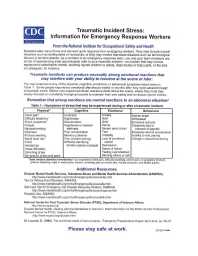Mining Publication: Traumatic Incident Stress: Information for Emergency Response Workers
Original creation date: January 2002
Disasters take many forms and demand quick response from emergency workers. They may include natural disasters such as earthquakes or hurricanes, or they may involve manmade disasters such as technological failures or terrorist attacks. As a member of an emergency response team, you and your team members are at risk of experiencing what psychologists refer to as a traumatic incident - an incident that may involve exposure to catastrophic events, severely injured children or adults, dead bodies or body parts, or the loss of colleagues, for instance. You may experience any of the physical, cognitive, emotional, or behavioral symptoms listed in the document. Some people experience emotional aftershocks weeks or months after they have passed through a traumatic event. Others may experience these reactions while still at the scene, where they must stay clearly focused on constantly changing hazards to maintain their own safety and to rescue injured victims.
Authors: KM Kowalski
NIOSH/USBM Numbered Publication - January 2002
NIOSHTIC2 Number: 20022121
NIOSH Publication No. 2002-107, 2002 Jan; :1-2
See Also
- Content source: National Institute for Occupational Safety and Health, Mining Program


 ShareCompartir
ShareCompartir
